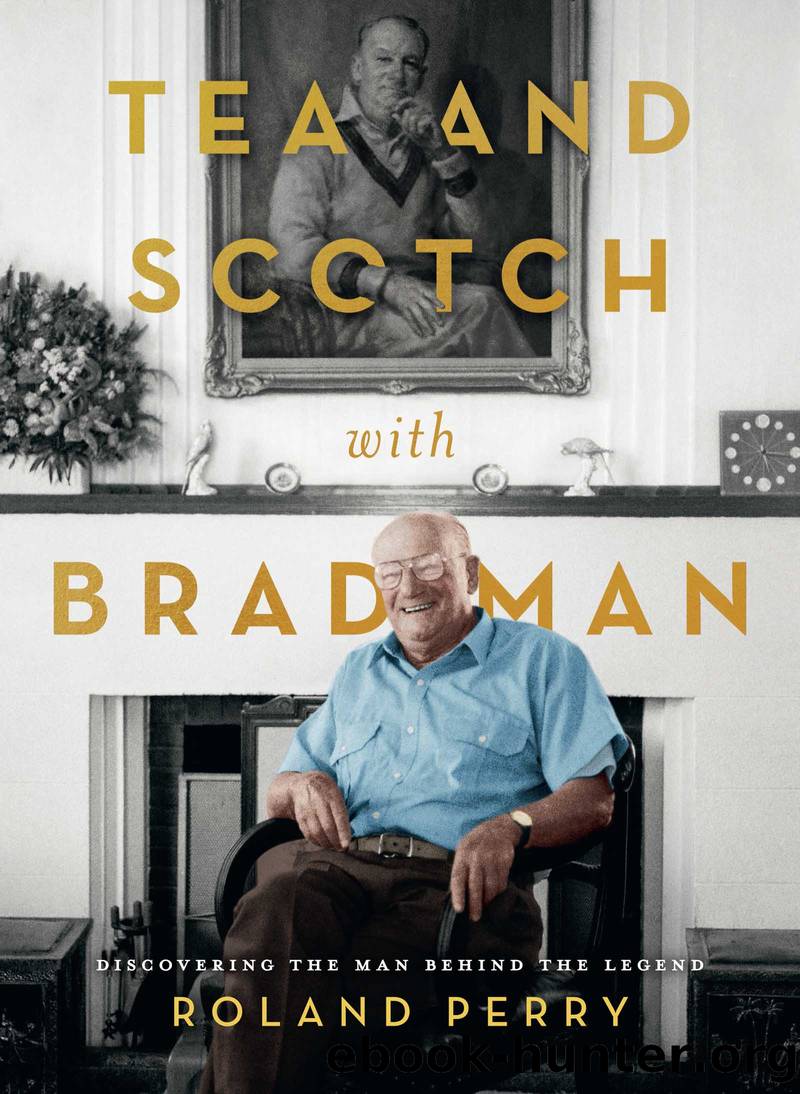Tea and Scotch with Bradman by Roland Perry

Author:Roland Perry
Language: eng
Format: epub
Publisher: ABC Books
Published: 2019-09-13T00:00:00+00:00
CHAPTER 23
Nelson Mandela’s Hero
In 1971, I was a journalist at The Age, and I recall Peter McFarline, a notable sports writer, returning from the ACB media conference and slamming a file on his desk.
‘Bloody Bradman!’ he said, loud enough for me to hear from a few metres away.
‘What’s wrong, Peter?’ I asked.
He told me about the conference and how Bradman had made the statement, turned on his heel and disappeared into the ACB building.
‘He wouldn’t take any questions,’ McFarline complained. ‘He makes a bloody important statement like that and won’t give any explanation!’
Just about every top editor in Australia had Bradman’s phone number. He made himself available, sort of. Everyone knew you did not waste his time. The reason for a call had to be valid and ‘important’, otherwise you would receive short shrift and risk not having access if something big happened and you wanted his comment.
The reverse was interesting. If Bradman wished to make a statement about a cricketer’s milestone or the passing of a star, he would call one of the big dailies in Melbourne or Sydney and his comments would be taken down and published. I remember sitting at my desk and watching editors running across the floor in a commotion. I asked an editor what was going on.
‘Bradman’s on the line,’ he replied in a reverential tone. ‘We can’t find [Graham] Perkin [The Age editor-in-chief].’
In 1959, Perkin had built trust with Bradman after first interviewing him in the lounge of Bradman’s Adelaide home. He then observed that Bradman had been an ‘imponderable personality’ through his entire cricket career.
‘No one knew what he was really like,’ Perkin wrote, ‘though many thought they did . . . He was an ordinary small man [of 51 years] in a grey suit. But as he sipped his tea, another impression came through strongly . . .’ Perkin imagined that if his subject put on flannels and pads and walked out to the wicket that day, ‘he would surely get a fast hundred’.
*
On the occasion of Bradman’s one-line apartheid statement, Perkin suggested McFarline ring Bradman. In his eagerness to speak to him, McFarline was rude to Jessie. Bradman told him off for that and refused to talk to him. Discourtesy to his wife was a major sin in Bradman’s eyes.
In South Africa, Vorster vented his anger publicly against Bradman while the main anti-apartheid organisation, the (black) African National Conference, rejoiced.
Burgmann, unaware that Bradman had met Vorster, Wilson and Heath, was again surprised.
‘We expected him to use the excuse of not being able to guarantee the safety of the cricketers,’ she said, ‘but he made this wonderful statement, which pleased us [the protestors].’
Burgmann and Rivett congratulated him.
‘I appreciate the compliments,’ he wrote to Rivett in September 1971, ‘but, no offence meant, I’m not really in the mood to feel elated. I’ve seen too much of both sides of the issue [which included the impact on the banned, innocent white cricketers], the good and bad of each. I was not cut out to be a politician or banner-carrier.
Download
This site does not store any files on its server. We only index and link to content provided by other sites. Please contact the content providers to delete copyright contents if any and email us, we'll remove relevant links or contents immediately.
Spare by Prince Harry The Duke of Sussex(5197)
Machine Learning at Scale with H2O by Gregory Keys | David Whiting(4313)
Never by Ken Follett(3957)
Harry Potter and the Goblet Of Fire by J.K. Rowling(3858)
I Have Something to Say by John Bowe(3501)
Fairy Tale by Stephen King(3399)
Unfinished: A Memoir by Priyanka Chopra Jonas(3391)
Greenlights by Matthew McConaughey(3183)
The Man Who Died Twice by Richard Osman(3080)
Will by Will Smith(2920)
Think Again by Adam Grant(2471)
It Starts With Us (It Ends with Us #2) by Colleen Hoover(2367)
Rationality by Steven Pinker(2366)
Can't Hurt Me: Master Your Mind and Defy the Odds - Clean Edition by David Goggins(2341)
The Dark Hours by Michael Connelly(2309)
The Storyteller by Dave Grohl(2236)
Friends, Lovers, and the Big Terrible Thing by Matthew Perry(2230)
The Dawn of Everything: A New History of Humanity by David Graeber & David Wengrow(2210)
The Becoming by Nora Roberts(2203)
